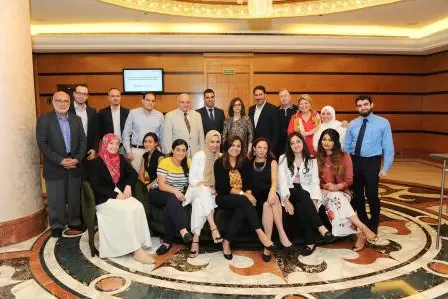PHOTO
Doha: Weill Cornell Medicine-Qatar (WCM-Q) has collaborated with regional and international experts to adapt international guidelines for the management of rheumatoid arthritis to the Eastern Mediterranean region.
The project brought together experts from 24 institutions across the region, the USA and Canada to adapt the guidelines of the American College of Rheumatology (ACR) to suit local circumstances. The ultimate aim of the project is to ensure rheumatoid arthritis patients across the Eastern Mediterranean region receive the very best care possible.
Rheumatoid arthritis is characterized by painful inflammation and progressive immobility of the joints, particularly in the hands, feet and cervical spine. While there is currently no cure for rheumatoid arthritis, if treated correctly symptoms can be alleviated and progression of the disease slowed.
The guideline adaptation project was conducted under the guidance of Dr. Thurayya Arayssi, WCM-Q Senior Associate Dean for Medical Education and a practicing rheumatologist, in partnership with Dr. Elie Akl, Professor of Medicine and Director of the American University of Beirut (AUB) GRADE Center, and Director of the Clinical Research Institute at AUB.
Dr. Arayssi said: “Because rheumatoid arthritis cannot be cured, treatment focuses on long-term management of the disease. As such, it is very important that rheumatologists have access to the most up-to-date treatment guidelines so their patients receive the best possible care. To that end, we have been working with colleagues across the Eastern Mediterranean countries to adapt the guidelines of the ACR so that they suit the local healthcare systems, cultures and economic circumstances.”
Dr. Arayssi has been working with fellow clinicians and epidemiologists to systematically analyze each of the treatment guidelines of the ACR and tailor them to the Eastern Mediterranean region. This process of adaptation and development of guidelines (known in the medical world as ‘adolopment’) follows an established protocol that considers factors such as cost, impact on health equities, balance of benefits and harms, and acceptability. Adolopment is considered to be far more efficient in terms of time and expense than creating new or ‘de novo’ guidelines from scratch.
The working group adapted the ACR guidelines in two separate waves, eventually producing 16 recommendations for the management of early and established rheumatoid arthritis in the Eastern Mediterranean region.
Dr. Akl said: “The group led by Dr. Arayssi has done pioneering work in terms of regional approach to guideline adaptation. Other groups, from as far away as Brazil, for example, are learning from our experience to adapt the same guidelines to their own contexts. I believe that the already existing regional network of experts as well as the willingness of the ACR to support this project were key factors for success.”
The results of this process have now been documented in a research paper entitled ‘Recommendations for the management of rheumatoid arthritis in the Eastern Mediterranean region: an adolopment of the 2015 American College of Rheumatology guidelines’, which has been published in Clinical Rheumatology, a leading medical journal. The group has also published its methodology in Health and Quality of Life Outcomes, another leading journal.
The Qatar National Research Fund’s (QNRF) Conference & Workshop Sponsorship Program (CWSP) and Weill Cornell Medical College in Qatar funded the first wave of adaptation. The International League of Associations for Rheumatology (ILAR) funded the second wave of adaptation.
The research paper can be viewed at https://www.ncbi.nlm.nih.gov/pubmed/30097896
The methodology paper can be viewed at https://www.ncbi.nlm.nih.gov/pubmed/28934978
-Ends -
About Weill Cornell Medicine - Qatar
Weill Cornell Medicine - Qatar is a partnership between Cornell University and Qatar Foundation. It offers a comprehensive six-year medical program leading to the Cornell University M.D. degree with teaching by Cornell and Weill Cornell faculty and by physicians at Hamad Medical Corporation (HMC), Aspetar Orthopedic and Sports Medicine Hospital, the Primary Health Care Corporation, the Feto Maternal Center, and Sidra Medicine, who hold Weill Cornell appointments. Through its biomedical research program, WCM-Q is building a sustainable research community in Qatar while advancing basic science and clinical research. Through its medical college, WCM-Q seeks to provide the finest education possible for medical students, to improve health care both now and for future generations, and to provide high quality health care to the Qatari population.
For more info, please contact:
Hanan Lakkis
Associate Director, Media
Weill Cornell Medicine - Qatar
Mobile: +974 55536564
Direct Line: +974 44928661
hyl2004@qatar-med.cornell.edu
Disclaimer: The contents of this press release was provided from an external third party provider. This website is not responsible for, and does not control, such external content. This content is provided on an “as is” and “as available” basis and has not been edited in any way. Neither this website nor our affiliates guarantee the accuracy of or endorse the views or opinions expressed in this press release.
The press release is provided for informational purposes only. The content does not provide tax, legal or investment advice or opinion regarding the suitability, value or profitability of any particular security, portfolio or investment strategy. Neither this website nor our affiliates shall be liable for any errors or inaccuracies in the content, or for any actions taken by you in reliance thereon. You expressly agree that your use of the information within this article is at your sole risk.
To the fullest extent permitted by applicable law, this website, its parent company, its subsidiaries, its affiliates and the respective shareholders, directors, officers, employees, agents, advertisers, content providers and licensors will not be liable (jointly or severally) to you for any direct, indirect, consequential, special, incidental, punitive or exemplary damages, including without limitation, lost profits, lost savings and lost revenues, whether in negligence, tort, contract or any other theory of liability, even if the parties have been advised of the possibility or could have foreseen any such damages.




















